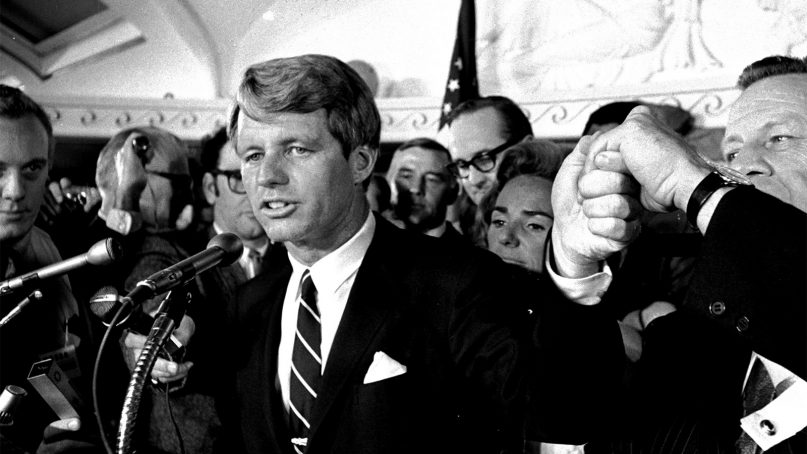It was a day that I will always remember.
A number of years ago, I had the honor of sitting on the pulpit of the Ebenezer Baptist Church in Atlanta, as part of the commemoration of Dr. Martin Luther King’s birthday.
I was seated next to Kerry Kennedy, the daughter of the late Senator Robert F. Kennedy.
As the service was about to begin, there was a moment when Kerry had a brief, whispered conversation with the son of Reverend Martin Luther King. It was, to quite a photo op, but not even the most skilled photographer could have captured the poignancy of the moment.
Kerry Kennedy and Martin Luther King III both lost their fathers within months of each other, in April and June 1968. Both men were victims of assassins’ bullets. Both men died, in the words of the Hebrew poet Chayim Nachman Bialik, “before their time and before anyone’s time.” Each one had one more song to sing, but those songs had been stilled forever.
Fifty years later, it is worth remembering that moment, and it is worth remembering the life and legacy of Senator Robert Kennedy.
Especially for American Jews.
Why?
Kennedy was assassinated in the kitchen of the Ambassador Hotel in Los Angeles shortly after midnight on June 5, 1968 — 50 years ago this week. It was in the wake of his victory in the California presidential primary.
Kennedy’s assassin was a Palestinian resident of Silwan in East Jerusalem, Sirhan Bishara Sirhan – notwithstanding Robert Kennedy Jr.’s nagging suspicion that there was an additional gunman (shades of the JFK assassination theories).
He chose to kill Kennedy on that exact date because it coincided with the first anniversary of Israel’s stunning victory during the Six-Day War. Sirhan hated Kennedy because he had supported Israel; in fact, that was exactly what Sirhan said when he testified at his own trial. He remains in prison, serving a life sentence for the murder.

Robert Kennedy (1925-1968). Photo courtesy of Creative Commons
Why is it important that we remember this barely-remembered historical tidbit about the death of Kennedy?
Because Robert Kennedy was the first American victim of modern Arab terrorism.
Note that I did not say “Islamic” terrorism; Sirhan Bishara Sirhan is a Palestinian Christian. The name Bishara is a popular Arab Christian name – from the Arabic word for “flesh,” as in the flesh of Jesus.
But what he shared with many of his Muslim cousins was a visceral, irrational hatred of Israel. It drove him to murder a man whom some still believe might have been the greatest hope of an earlier generation.
One man’s hatred of Israel utterly re-directed American political life and the story of the presidency.
Kennedy’s assassination eliminated the one Democratic candidate who arguably could have unified the party and invigorated it with a new sense of vision. It led to the nomination of Hubert Humphrey and, to our lasting chagrin, ultimately to the victory of Richard Nixon.
It would be decades before the emergence of a Democratic candidate whose voice could mobilize young people and point the way to a deeper sense of involvement in the political process.
In remembering Bobby Kennedy, let us remember not just what he lived for, but also what he died for — namely, the precious nature of the American-Israeli relationship.
Many Americans sense that Israel’s enemies and the enemies of the United States are one and the same.
Many Americans also recognize that Israel and the United States are among the only countries in the world today that were founded on ideas. Both countries share fundamental values — democracy, freedom, the rule of law — as well as the struggle to create those values and bring them to fruition. It’s why anti-Israel sentiment and anti-Americanism walk, demonically, hand in hand.
That is why the fiftieth anniversary of Kennedy’s assassination is a sobering moment in our national history. We not only lost Bobby Kennedy, we lost what had been — and what could have continued to be — a precious voice in our national narrative.
When I remember Bobby Kennedy in my prayers this week, I will remember that hope.
I will remember why he died — and hope that his vision of Israeli-American cooperation will long survive him.
And, I will remember these words that he spoke in June, 1966 at the University of Cape Town:
“Each time a man stands up for an ideal, or acts to improve the lot of others, or strikes out against injustice, he sends forth a tiny ripple of hope…those ripples build a current which can sweep down the mightiest walls of oppression and resistance.”
May the memory of Robert F. Kennedy be an eternal blessing.






